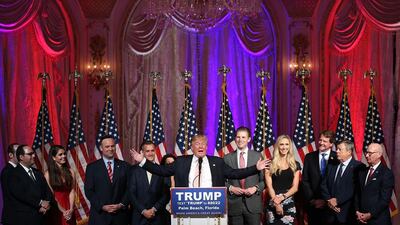PHILADELPHIA // The violence at recent campaign rallies for US presidential hopeful Donald Trump is a symptom, experts say, of not only a corroding democratic process but perhaps even an impending split of the traditionally conservative Republican party.
Last week, a video that quickly went viral showed a Trump supporter — a 78-year-old man with a ponytail — punching a young black protester in the face on March 9. John McGraw, the attacker, later said: “The next time we see him, we might have to kill him ... He might be with a terrorist organisation. ”On March 11, protesters and Trump supporters scuffled in Missouri, leading to the arrest of 32 people. A Chicago event slated for the same day was cancelled out of fear that similar clashes there could escalate into a full-blown riot.
The Trump supporters in Chicago chanted his name as protesters — a mix of Hispanics, African-Americans, and people wearing T-shirts with the slogan “Muslims United Against Trump” — shouted back, taunting their opponents. Five people were arrested, and three people were injured in the Chicago clashes.
The next day, a protester charged the stage as Mr Trump was addressing a campaign event in Ohio, though a rally in Florida on Sunday managed to pass without disruption.
The repeated violence prompted president Barack Obama to express concern.
“I’m not the only one in this room who’s been more than a little dismayed about what’s been happening,” Mr Obama said on Tuesday. “We’ve seen actual violence ... It’s worth asking ourselves what each of us has done to contribute to this vicious atmosphere in our politics.”
Mr Trump has played down the seriousness of these incidents, to the point of denying they even happened.
“First of all let’s not even use the word violence,” the front-runner Republican said. “There’s very little disruption, generally speaking. It’s a function of the press — the press likes to say what the press likes to say. But there’s no violence. Nobody’s been hurt.”
But Mr Trump’s critics are blaming his rhetoric for inciting the violence.
At a campaign event in Nevada in February, as security escorted a protester out of the hall, Mr Trump said: “I’d like to punch him in the face.”
At other times, Mr Trump encouraged his audience to “knock the crap out of” hecklers. He also talked wistfully of “the old days” when protesters would be “carried out on a stretcher”.
“Candidates try to rev up voter fear and anxiety, and sometimes anger. It’s a way of motivating people to vote,” said Mary Stuckey, a communications scholar at the University of Georgia who has written extensively on presidential rhetoric and communication. “But we need to distinguish ... between anger and violence.”
Dr Stuckey said she had “never seen a candidate so willing to overtly incite violence”.
Calling Mr Trump's campaign vile, the New York Times said in an editorial on Monday that he was providing licence to his supporters to resort to violence.
Mr Trump’s campaign of “fear and demagoguery” is not without precedent, said Dewey Clayton, a political scientist at the University of Louisville.
Dr Clayton referred to George Wallace, a staunch segregationist who ran for president as an independent in 1968. Like Mr Trump, Mr Wallace appealed to white, blue-collar workers who feared for their jobs, often using racist and divisive arguments in his speeches.
At one New York City rally, “pro-Wallace supporters clashed with anti-Wallace protesters, and both clashed with the police”, Dr Clayton said.
In his populism, Dr Clayton said, “Trump represents Americans who detest the liberal media, government intrusion, the loss of religious values, and economic uncertainty. Sadly, he has done very little to tamp down the incendiary rhetoric which has led to the violence.”
In the long term, the Republican party will split into two factions, he said.
“Trump may do serious damage to the party as it exists today, because his faction is too far extreme for many Americans. We may be seeing the last of the Republican party as it now exists.”
More dire still, said Dr Stuckey, was the effect that Mr Trump’s campaign was having on the electoral process itself.
“There is something that feels especially unhinged about this election. It’s frightening. It’s corrosive,” she said.
“Democracy depends upon societal norms of tolerance, respect and compromise. This kind of behaviour makes all of those things harder to maintain.”
ssubramanian@thenational.ae

